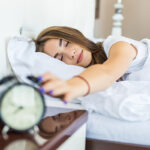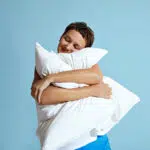Hydroxyzine for Sleep: Everything You Need to Know
According to the CDC, over 8% of American adults take a sleep aid at least 4 times a week. This includes both prescription and over-the-counter (OTC) medications. These statistics bring into sharp focus just how much people are struggling to achieve quality sleep and what lengths they’ll go to in order to get it.

Even with dozens of sleep aids, supplements, and medications on the market, insomnia sufferers are constantly looking for different ways to ease their sleep troubles. Sometimes, relief comes in the unlikeliest of places or from medications that aren’t specifically designed to treat insomnia. You may be wondering, is it safe to take a medication prescribed for a different medical issue if it helps you sleep better?
The jury’s still out on this, however, there are plenty of medications available that treat specific conditions with the added benefit of easing insomnia symptoms. One such medicine is Hydroxyzine. In this article, we’ll take a closer look at what this medicine is, how it works, and if you can safely use it as a sleep aid.
Content
What is Hydroxyzine?
Hydroxyzine, also known as Atarax or Vistaril, is a prescription antihistamine, which means it’s used to treat allergic reactions. If you’ve ever taken Benadryl, another popular antihistamine, and felt overwhelmingly groggy or drowsy, you know that one of the main side effects of this type of medicine is fatigue. For this reason, some people turn to Hydroxyzine as a sleep aid.

Histamines are chemicals within your body that respond to allergens from things like food, pollen, or pet dander. These can cause mild to severe allergic reactions including itching or a rash, coughing, or sneezing. Antihistamines, like Hydroxyzine, stop your immune system from producing histamines, therefore, reducing these unpleasant symptoms.
There are two different classes of antihistamines with the first hitting the market in the 1930s. This first generation of drugs crossed the barrier into the brain, causing drowsiness. Second-generation antihistamines, which weren’t FDA-approved until the 80s, don’t make this same crossover (known as breaking the blood-brain barrier), and therefore, don’t cause excessive fatigue. Hydroxyzine is a first-generation antihistamine, which is why it has sleep-inducing effects. Second-generation antihistamines include Zyrtec and Claritin.
Potential Side Effects of Hydroxyzine
In addition to drowsiness, this antihistamine may cause other mild side effects. Here are some of the most common and as reported by consumers.
- Dizziness
- Dry mouth
- Headache
- Irritability
- Confusion
- Urinary retention
- Fainting

In rare cases, users may experience more serious side effects, including:
- Hallucinations
- Abnormal heart rate
- Seizure
- Priapism (an erection last more than 4 hours)
- Serious allergic reactions (swelling of the lips or face, difficulty breathing, hives)
Dosage, Dependency, and Withdrawal Symptoms
Not everyone requires the same dosage of Hydroxyzine. The dosage depends on what condition you’re treating, any other medications you’re currently taking, and your overall health. However, most people looking to ease insomnia symptoms take a daily dose between 25 mg and 100 mg, although some people need as little as 10 mg. You can take Hydroxyzine with or without food on a daily basis or on an as-needed basis. To avoid withdrawal symptoms, confer with your doctor before starting or stopping this medication.
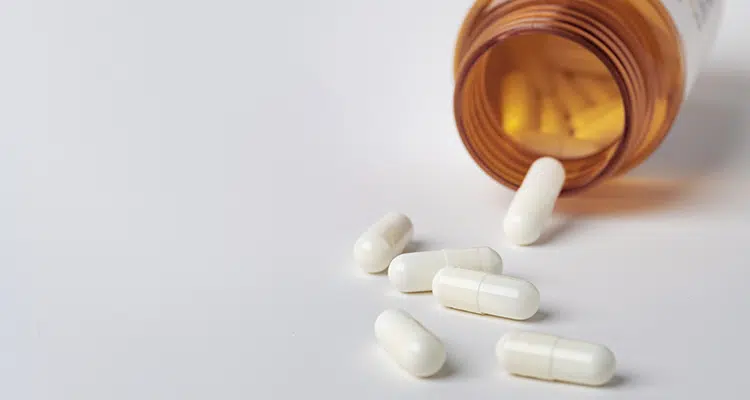
One of the main benefits of using this antihistamine for sleep is how quickly it works. Most users feel the calming, sedative effects of Hydroxyzine within 15 to 30 minutes, while for some, it takes up to 2 hours. One important thing to consider before taking this drug is that the half-life is relatively long – 20 hours. This means that it takes up to 20 hours for most people to metabolize the medication and for it to reach half its original concentration and strength. When a medication has this long of a half-life, it means that some of its side effects will last for much longer than intended. For example, some people feel groggy after taking Hydroxyzine, even after sleeping for 8 to 10 hours. To prevent excessive daytime drowsiness, only take this medication when you can dedicate plenty of time to sleep.
Most people taking Hydroxyzine as intended only experience mild side effects or none at all. Dependency isn’t usually an issue since this particular drug isn’t habit-forming, which makes it all the more appealing for both allergy and insomnia sufferers.
It’s important to note that you can still become dependent on Hydroxyzine without being addicted to it. Addiction is usually rooted in your brain, while dependency happens when your body develops a physical dependency on a particular substance. Without it, you can go into withdrawal. If you’re taking Hydroxyzine regularly and abruptly stop, you may experience nausea, increased heart rate, mood swings, and headaches. Because of this, it’s important to consult with a doctor or healthcare professional before starting or stopping the use of this medication.
Does Hydroxyzine Negatively Interact with Other Drugs?
Drug interaction is another thing to consider when using Hydroxyzine to treat allergies or for its sleep-inducing benefits. Anytime you take more than one medication at a time, you need to consider how they’ll interact and what effects they’ll have on your mind and body. The good news is that Hydroxyzine has fewer drug interactions compared to others in its class.

Taking Hydroxyzine in combination with the following medications could intensify the effects:
- Medications that have anticholinergic effects (benztropine)
- Any other medications that cause drowsiness including muscle relaxers
- Zyrtec, Claritin, or any other antihistamines
Who Shouldn’t Take Hydroxyzine?

It’s always best to consult with a healthcare professional before incorporating any medications into your daily routine. Whether you’re using Hydroxyzine as a sleep aid or an antihistamine, certain people are at a higher risk of side effects. These include those with a history of:
- Heart disease
- Glaucoma
- Digestive tract issues (blockage)
- Family history of long QT syndrome
- Urination or bladder issues
- Electrolyte imbalance
- Women who are pregnant, breastfeeding or planning to become pregnant
Hydroxyzine for Sleep
As an antihistamine, Hydroxyzine is effective at treating and preventing certain allergic reactions. But how does it work for sleep and is it a safe alternative to traditional sleep aids? Let’s take a look.
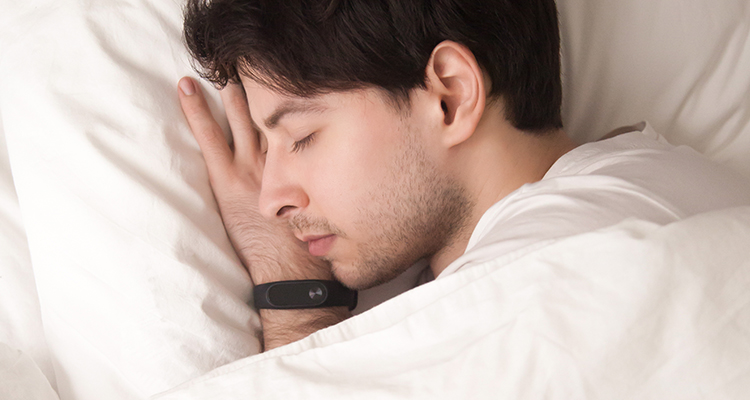
The sedative properties and minimal side effects found in Hydroxyzine make it a viable treatment for insomnia. In fact, some doctors prescribe this medication for this exact purpose. Not only can Hydroxyzine help induce sleep, but it also has calming benefits, which may help reduce anxiety at night – a common trigger for insomnia.
But this isn’t the only way that Hydroxyzine improves sleep. Histamines, in general, are linked to your body’s circadian rhythm (also known as the sleep-wake cycle). When histamines are released by your immune system, they send a signal to your brain that it’s time to wake up. This is one reason why an influx of histamines at night can make it difficult to fall and stay asleep. Because antihistamines are designed to block the release of these chemicals into your body, Hydroxyzine can stop these “alert” messages from reaching your brain, making it easier to fall asleep.
In most cases, Hydroxyzine is used as a short-term solution to treat acute insomnia and other sleep disorders. It’s also commonly prescribed following a stressful or traumatic life event that’s negatively interfering with your ability to fall and stay asleep. Taking this antihistamine for too long could result in a tolerance to its calming effects, rendering it useless. Another potential side effect is a lack of deep sleep, which is an essential stage of the sleep cycle when your body releases growth hormones, improves immune functions, and works to repair tissues, muscles, and bones.
Hydroxyzine and Anxiety
As of this writing, Hydroxyzine isn’t FDA-approved for use as an insomnia treatment but it is an acceptable medication for treating generalized anxiety disorder (GAD). Individuals with GAD experience persistent feelings of worry or fear, which Hydroxyzine can help reduce.

While there’s no clear evidence as to how this is done, scientists and doctors believe that the antihistamine has a direct effect on serotonin levels in the brain. Serotonin is a natural chemical that triggers feelings of happiness, calm, and relaxation. By reducing anxiety and increasing feelings of relaxation, Hydroxyzine may also improve sleep. As an anxiety treatment, Hydroxyzine did show higher than normal levels of lethargy and drowsiness than other anti-anxiety medications.
Because anxiety and insomnia are so closely related, Hydroxyzine is a viable option for those who struggle with both. Anxious, racing thoughts at night can lead to hyperarousal, making it nearly impossible to fall asleep. And when you do finally drift off to sleep, increased awareness can cause you to wake up frequently throughout the night. Additionally, people with a diagnosed anxiety disorder also have higher sleep reactivity, which is the level at which stress interrupts your natural sleep cycles, leading to inconsistent sleep, insomnia, and other sleep troubles.
Hydroxyzine and Depression
Depression, like anxiety, is a leading cause of insomnia and other sleep disturbances. Depression is the most common type of mood disorder and is characterized by feelings of hopelessness, overwhelming sadness, and lack of motivation. Some depressive episodes can last from a few days to a few weeks and may be debilitating in some cases.

Studies show that the antihistamine Hydroxyzine may benefit those with depressive disorders as well. As of this writing, Hydroxyzine is not approved by the FDA as an antidepressant and there’s no scientific evidence to suggest that it can treat mental health disorders. However, some people suffering from insomnia caused by depression find relief from this popular drug. Similar to the positive effects it has on those with anxiety, Hydroxyzine can reduce feelings of sadness and depression by increasing serotonin levels and improving your mood.
Tips for Using Hydroxyzine for Sleep
As beneficial as Hydroxyzine may be for sleep, it’s not a miracle cure. Lifestyle changes, therapy, and taking a closer look at what’s actually triggering your insomnia are all important steps in finding the best treatment plan for your unique needs. If you choose to adopt this antihistamine into your routine (after consulting with your doctor), here are a few tips for doing so safely and effectively.
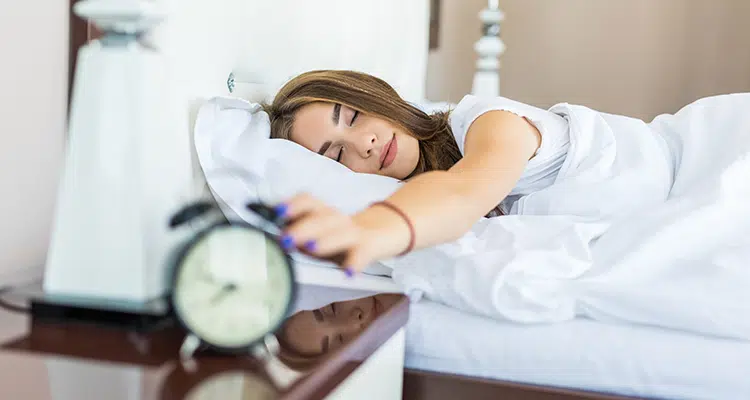
Follow Dosage Instructions and Look Out for Warning Signs
If you’ve never taken a sleep aid or antihistamine, it’s important to do so under the guidance of a doctor and be aware of any signs of an allergic reaction or dangerous side effects. Avoid performing any risky work or driving when taking this medication, since it can cause dizziness and extreme drowsiness. Monitor your reaction to the medication to see if you need to adjust your dosage, more or less.
Set a Sleep Schedule and Routine
Taking Hydroxyzine around the same time every night will help create a routine that your brain and body rely on. It will also ensure that you’re experiencing the desired benefits at the right time each night, without them carrying through into the next morning.
Set a sleep schedule that includes going to bed at night and getting up in the morning at the same time. Doing so helps align your circadian rhythm, making it easier to fall and stay asleep. Create a nighttime routine where you perform the same relaxing behaviors in the same order each night before bed. One of these behaviors should be taking your medication. You can also listen to soothing music, take a warm bath, or write in a sleep journal to help calm your mind and body.
Limit Caffeine, Nicotine, and Alcohol Intake
Caffeine and nicotine are both stimulants that can cause unwanted arousal at night. They may also negatively interfere with the positive effects of Hydroxyzine. Avoid drinking caffeinated beverages too late in the afternoon including coffee, tea, sports, and energy drinks. While alcohol may cause you to feel sleepy at first, once these effects wear off, you’ll likely feel awake, agitated, and aroused. Swap these habits for healthier ones like drinking chamomile tea, meditating, and getting plenty of physical activity, all of which promote good sleep habits.
Experiencing the Benefits of Hydroxyzine for Sleep
Chronic insomnia sufferers know how debilitating and even depressing long-term sleep deprivation can be. You may feel hopeless that you’ll never enjoy a night of deep, restorative sleep again. With the right combination of lifestyle changes, therapy, and in some cases, medication, you can find the relief you need. If you’re currently suffering from insomnia or insomnia caused by anxiety or depression, talk to your doctor about Hydroxyzine. While not all uses are FDA-approved, countless insomnia patients have found relief using this antihistamine.
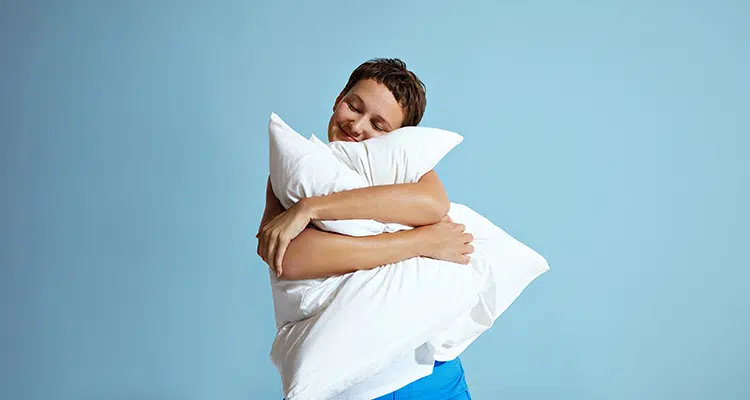
In the meantime, you can start making changes to your sleep habits now. And the sleep therapists and experts at Somnus Therapy can help. Click here for more information.









